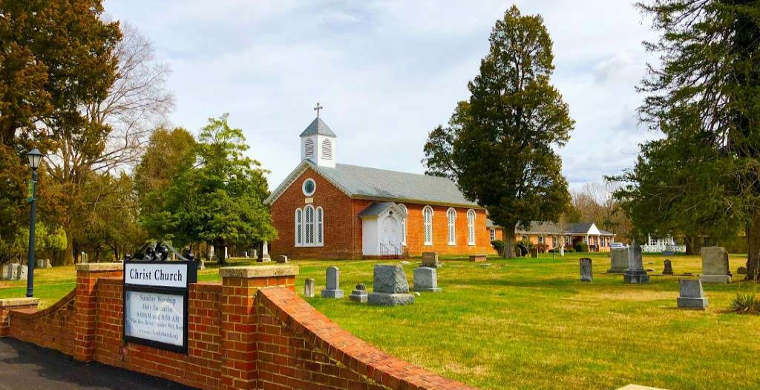Christ Church's Amicable Episcopal Separation
By Jeffrey Walton
https://juicyecumenism.com/2021/05/04/christ-church-accokeek/
May 4, 2021
Amicable parish departures from the Episcopal Church (TEC) are rare, especially those involving property.
Announcement of a negotiated agreement between the Episcopal Diocese of Washington and Christ Church in Accokeek, Maryland potentially marks a shift in church policy. Situated outside of Washington, the historic parish has had a tense -- and for a time legally adversarial -- relationship with its diocese.
No longer. Washington Bishop Mariann Budde released a public statement April 29:
"After a lengthy process of prayerful discernment, respectful conversation, and engagement with the Presiding Bishop's Office and the Standing Committee, the leadership of the Diocese of Washington, working together with the leadership of Christ Church Accokeek, has decided to sell the property of Christ Church Accokeek to a new corporate entity that is not in union with the Diocese. We have reached this decision in a spirit of friendship."
The congregation and its clergy were provisionally received into the Anglican Church in North America (ACNA) on April 2. Christ Church Rector Fr. Brian Vander Wel said his Anglican ordination vows that evening.
"We are delighted to receive Christ Church and its rector, the Rev. Brian Vander Wel, into the Diocese of the Mid-Atlantic and the Anglican Church in North America," Bishop John Guernsey wrote via e-mail. "They have been resolute in standing for the Gospel and the authority of the Scriptures. They have prayed and trusted the Lord and persevered in faith, and they have walked through this long process of negotiations with a godliness that has been a wonderful witness to everyone involved. I was able to worship with them for their Stations of the Cross service on Good Friday evening. What a blessing to experience that most holy day with a vibrant congregation that was more than one-third elementary school age children."
A Long Road
Vander Wel declined to address the negotiated agreement, citing legal confidentiality, aside from confirming the accuracy of Budde's statement.
In addressing his personal experience, the Maryland clergyman struck a reconciliatory tone.
"My desire was for the Gospel of Jesus Christ to go forward in this life and this circumstance that we are in," Vander Wel recounted in a telephone interview. "Part of the posture that I was given as I was thinking and praying about this, was Romans 12:18: 'If possible, so far as it depends on you, live peaceably with all.' That passage continued to mark all that I sought to do here."
Christ Church was first established as a congregation in 1698. It counts 133 members, with an average Sunday attendance of 84, according to church records.
"We've had a central role in the society and life in Accokeek," Vander Wel noted of the semi-rural parish. "We continue to desire to be that presence -- a central gathering place for the community, a place that the people and property itself would be a blessing to our neighbors. All in the name of Jesus Christ."
The Christ Church rector reported increased connections with homeschooling families, with as much as 35 percent of the congregation under the age of 16 in weekly Sunday worship.
Vander Wel identified Sunday school, youth formation, home school community life, and home school support as continued priorities.
"People who know classical Christian education know us and started to come to church," Vander Wel said. "They tend not to be Anglican or Episcopalian in heritage but are more broadly evangelical."
A History of Litigation
Episcopal litigation in church property disagreements has been the default at least since former Presiding Bishop Katharine Jefferts Schori was elected in 2006.
Jefferts Schori was the first church official to introduce churchwide policy on departures, previously deferred to diocesan officials. That older hands-off strategy enabled Christ Church of Plano, Texas (then the largest Episcopal parish) to negotiate departure from the Diocese of Dallas in 2003.
Two principles were later outlined by Jefferts Schori for the sale of church properties.
"One, that the church receive a reasonable approximation of fair market value for assets that are disposed of; and, second, that we not be in the business of setting up competitors that want to either destroy or replace the Episcopal Church," Jefferts Schori told NPR in 2012.
In short, church properties could be sold to anyone, for any purpose -- except those who claim Anglican identity after departing TEC.
Rare exceptions were St. George's Church in Helmetta, NJ, which negotiated departure from the Diocese of New Jersey, and Church of the Word in Gainesville, Virginia.
The latter had entered a financial agreement with the Virginia Department of Transportation to expand an adjacent roadway. The Episcopal Diocese agreed to release claim on the property in exchange for state funds from that deal, and an agreement that Church of the Word would not join ACNA for a period of five years.
Some parishes within the Diocese of Pittsburgh could be in the same category, subject to an agreement to pay a decreasing percentage of income to the Episcopal diocese on a continuing basis. That agreement was reached after Jefferts Schori departed office.
Each scenario either avoided or concluded costly property litigation brought about by Episcopal parties. Now Christ Church and the Diocese of Washington can be counted among those that found a workable arrangement.
END














